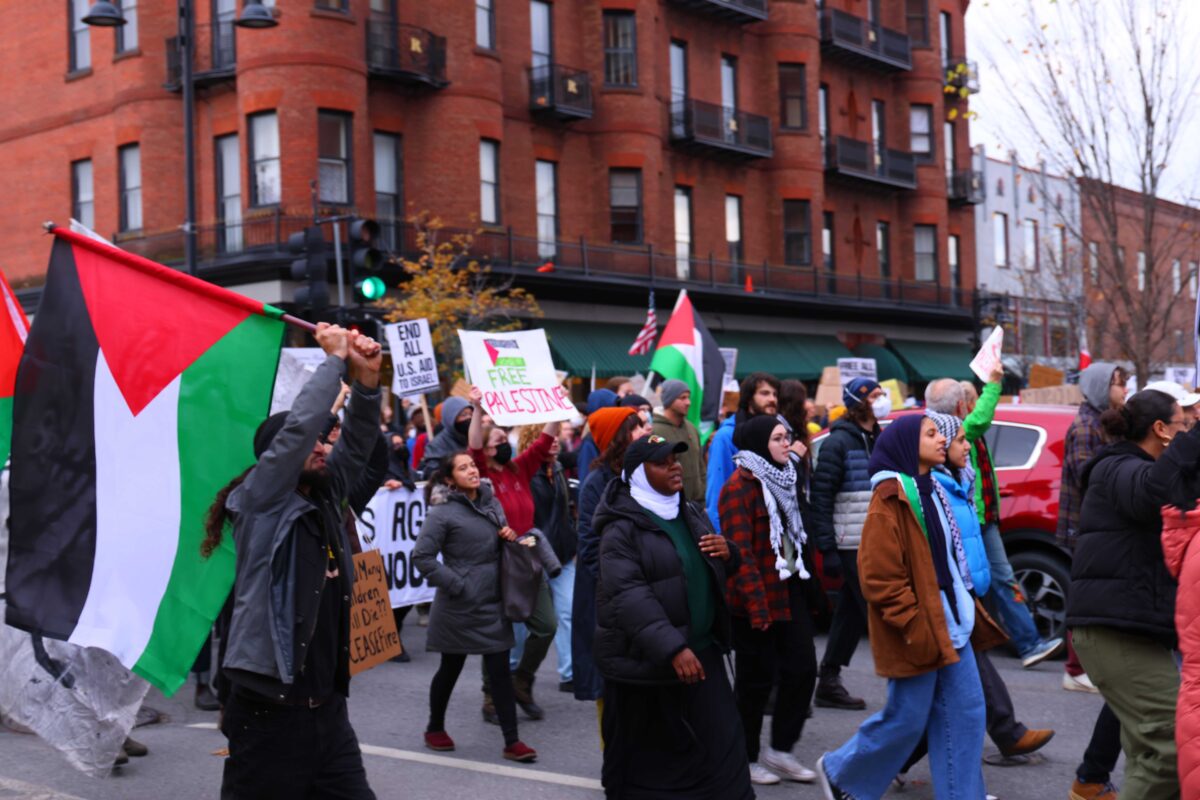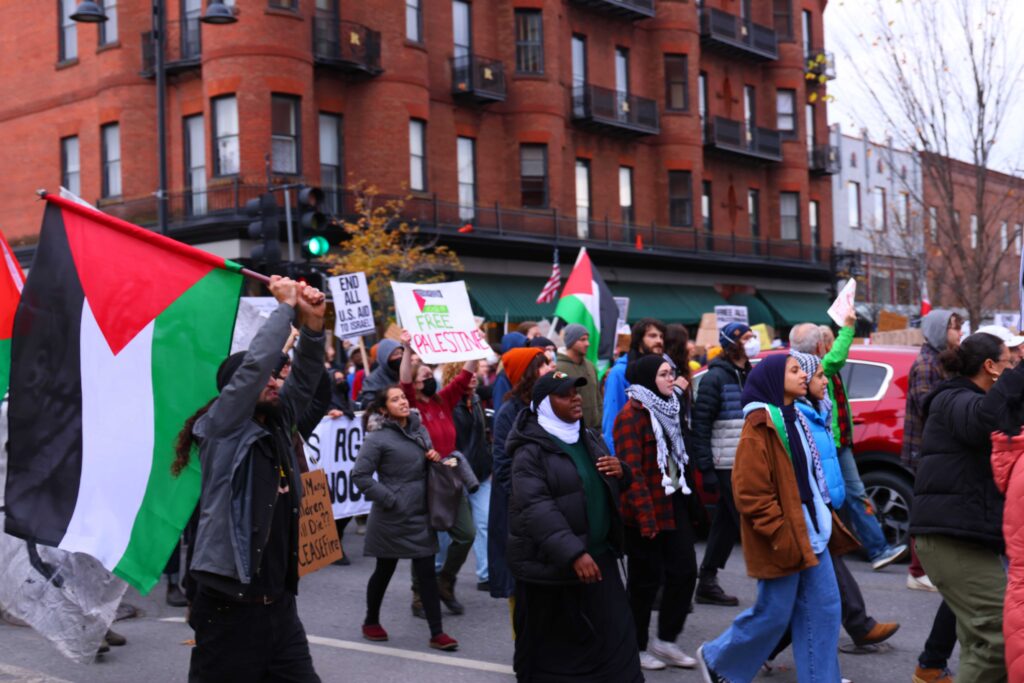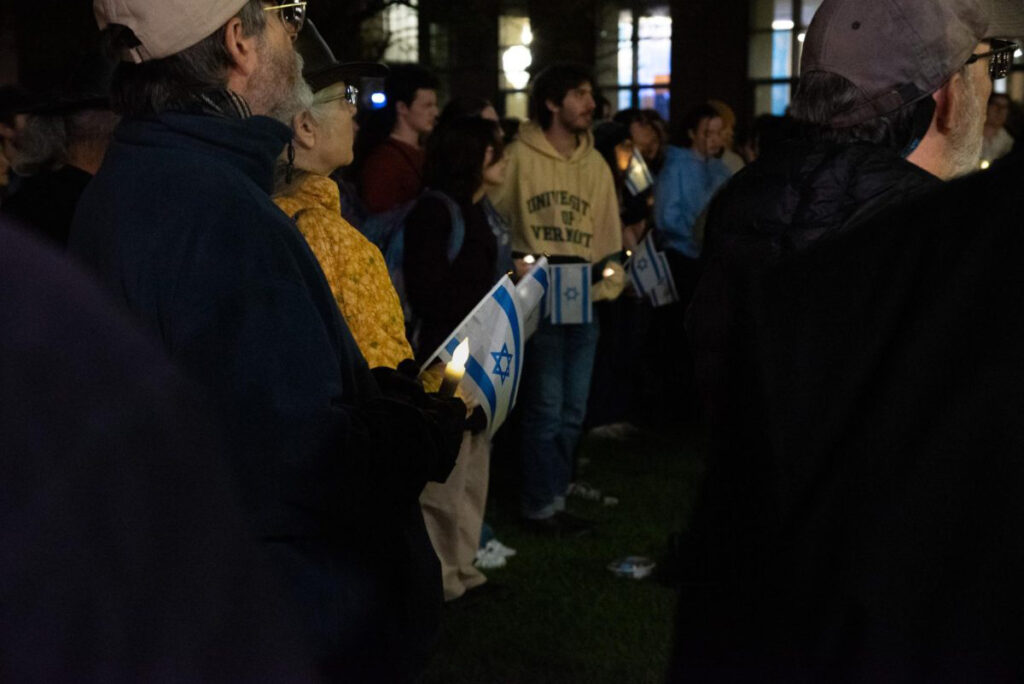
Catherine O’Donnell / Executive Editor / codonnell3@mail.smcvt.edu

The conflict in Israel and Gaza has triggered strong reactions on college campuses across the United States. Students are being confronted with a highly complicated issue, and displays of support
for both Palestine and Israel have led to tension in public and private spaces.
After the Hamas attack in Israel on Oct. 7, in which more than 1,200 Israelis were killed and around 240 people were taken hostage, according to the Israeli Foreign Ministry, the Israeli government vowed to destroy Hamas. Under heavy bombardment from Israeli military forces, and the subsequent and ongoing ground invasion, the death toll in Gaza has now surpassed 11,320 Palestinians, according to a statement by the Gaza Health Ministry, equating to 1 in 200 people. Gaza’s borders are blockaded by Israel and Egypt, leaving civilians with no way out.
On Saturday, Nov. 4, some students from the St. Michael’s College Diversity Coalition joined hundreds of people in Battery Park in Burlington, calling for Palestinian liberation and a ceasefire in Gaza. The event was part of a national march in Washington, D.C.
The rally and march were spearheaded by the University of Vermont Students for Justice in Palestine (UVM SJP), “a collective of students fighting for the liberation of Palestine,” according to the group’s Instagram page.
The UVM SJP is currently not recognized as an official club, according to the University of Vermont Student Government Association. George Washington University is one of multiple universities to suspend its SJP chapter, after it projected pro-Palestinian statements onto campus buildings.
Sponsors and community members gave speeches at the Burlington rally, demanding a ceasefire and an end to the oppression of Palestinians. They condemned the U.S. government and President Biden for sending military aid to Israel.
The St. Michael’s College Diversity Coalition sponsored the march, along with Vermonters for Justice in Palestine, Migrant Justice, Jewish Voice for Peace, and other groups.
Isabella Paredes Mendoza ‘24, co-president of the Diversity Coalition, said the club had attended UVM SJP’s candlelight vigil for Gaza on Oct. 19.
On Oct. 12, students at the University of Vermont held a vigil to honor Israeli victims and pray for the Jewish community. On Nov. 7, The University of Vermont Hillel, a national Jewish organization, coordinated a traditional Shloshim memorial prayer service for Israel. The first national march in support of Israel took place in Washington, D.C. on Nov. 14.
Since Oct. 7, antisemitic and Islamophobic incidents have been on the rise on college campuses. According to National Public Radio (NPR), Jewish students at Cornell University were violently threatened on a campus message board. At New York University, a law student lost a job offer after expressing pro-Palestinian views in a letter.
As the death toll in Gaza has mounted, the choice of language has been hotly debated. The phrase “From the river to the sea, Palestine will be free” has caused particular controversy. The phrase has been banned in Germany as hate speech.
Peter Henne, an associate professor of Political Science and the director of Middle East Studies at the University of Vermont, said the phrase originated with Palestinian nationalist movements and was later adopted by Hamas. It calls for Palestinian freedom on the land between the Jordan River and the Mediterranean Sea, which is Israel.
The phrase has been interpreted as calling for the elimination of Jews from the region.

“I think literally, the meaning is destroying the state of Israel,” Henne said. “If people say it’s not, it’s a little unclear how not.”
The president of Harvard University condemned the use of the phrase in a campus-wide email. This has called Harvard’s free speech policies into question, according to the Foundation for Individual Rights in Education.
The suspension of SJP chapters has also caused concerns regarding free speech. At George Washington University, the suspension is being challenged.
Many on the pro-Palestinian side argue that the “From the river to the sea” phrase does not have violent intent. “It is not a call for the decimation of Israelis, it is not a call for widespread antisemitism, it is quite literally people begging to be freed from colonial occupation,” said Inaash Islam, an assistant professor of Sociology at St. Michael’s College.
Some college students are hesitant to speak on the issue or reveal their identities.
“It makes me a little nervous when I’m at work when they, like, are walking up and down Church Street screaming,” said a Jewish University of Vermont student, who was in Burlington during the march for Palestine. The student opted to remain anonymous.
“As long as I outright don’t say I’m Jewish…then I feel safe.”
Professor Islam said that politicians and mass media have pushed a narrative that being pro-Palestine is the same as being pro-Hamas. However, she says pro-Palestinian protestors are advocating for a ceasefire and not sympathizing with Hamas.
“[The narrative] constrains how much Arab, Muslim, and Palestinian students can even voice their discontent, their grief, their sorrow, their anger,” Islam said.
“And as for Jewish students, as for pro-Israeli students, the same thing applies,” Islam continued. “Indicating your support for Israel is going to result in condemnation, it’s going to result in conflict, it’s going to result in tensions.”
Paredes Mendoza said that the Diversity Coalition was hesitant to sponsor the march and rally in Burlington. She felt that the public sponsorship of a pro-Palestine event went against the perceived neutrality of St. Michael’s College.
Fr. David Theroux, director of the Edmundite Center for Faith and Culture, sent a campus-wide statement on Oct. 14, urging peace on both sides and encouraging neutrality.
This has been the only campus-wide statement regarding the conflict.
Dawn Ellinwood, vice president of Student Affairs and dean of students, said that on-campus education is being discussed within the St. Michael’s College Cabinet.
“The impact is heavy,” Ellinwood said. “To get it right, it’s not just ‘let’s have a speaker.’ That’s not the answer. I think it’s inviting people together to have dialogue so people learn different perspectives.”
Jeffrey Trumbower, the vice president of Academic Affairs, said there will be an educational event on Nov. 30, aimed at informing students about the conflict.
A panel of speakers from the St. Michael’s College community will discuss its impact on Jewish, Arab, and Muslim communities. It will be held in McCarthy Recital Hall.
Deborah Amos, a journalism professor at Princeton University, spent decades reporting on the Middle East as an NPR correspondent.
Amos encourages her students to be wary of polarization and the pressure to “pick a side” in such a highly complicated situation.
“It’s a tough one when you feel this urge to have an opinion one way or the other because you see all your friends are doing it,” Amos said. “What I say is, you don’t have to do that. You don’t have to have an opinion on this. I say it’s better if you don’t. Just keep reading…”
Letter to the Editor
Dear Editor, I write on the behalf of Muslim, Arab, and Palestinian members at Saint Michael’s to express our disappointment at The Defender article, “Understanding the Israel-Hamas War.” This article’s publication illustrates The Defender’s failure to abide by its claims to offer “fair, in-depth reporting” in ways that aim to “professionally and ethically deliver the truth to our audience.” What this article includes and excludes, its use of language, and tenor contribute to the creation of a narrative that is not only one-sided, but dangerously minimizes the gravity of the sheer loss of human life. For example, the article begins with recognizing that on October 7, “more than 1,400 Israelis were massacred” by Hamas. Although the article was published on October 26th, there is not a single mention of the killings of Palestinians by Israel. The New York Times and Al-Jazeera reported on October 26th that between 6,747 and 7,028 Palestinians had been massacred by Israel since October 7. In deliberately choosing not to report this death toll, among other things, The Defender fails to abide by its claims of fair and ethical reporting. Furthermore, The Defender’s decision to ignore the loss of Palestinian life is not only dehumanizing, but effectively communicates to Saint Michael’s Muslim, MENA, and Palestinian members that our lives, and our deaths do not matter. Consider this message received. We call on The Defender to not uncritically reproduce narratives that reify systemic racisms perpetuated by mainstream media, hold itself accountable to its mission and reify our collective humanity. In solidarity with our global community, Dr. Inaash Islam Assistant Professor of Sociology Department of Sociology & Anthropology Dr. Islam can be reached by email at iislam@smcvt.edu and by telephone at 802.654.2367. Bio: Dr. Islam is a scholar of race, racism, media representations and the global war on terror.
The Defender is commited to a diversity of voices. We invite you to reach out to reach out to our staff with comments on this or any other story. Please see our website for guidelines on opinion pieces and letters to the editor. defender@smcvt.edu. Please check the ‘About’ section of the website for guidelines regarding community submissions to The Defender.

